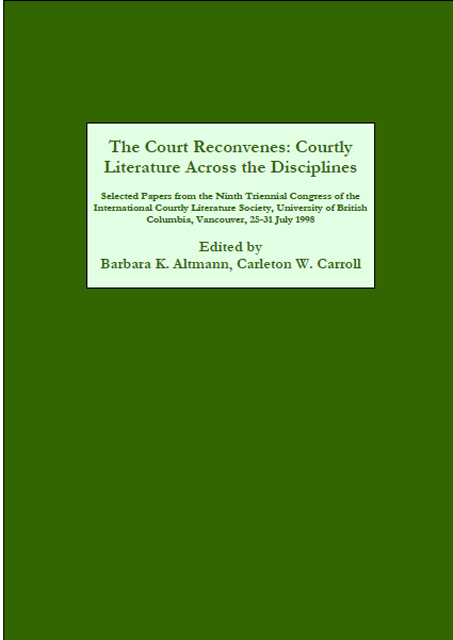 The Court Reconvenes
The Court Reconvenes Complaints of Women, Complaints by Women: Can One Tell Them Apart?
Published online by Cambridge University Press: 31 March 2023
Summary
I propose to examine four Old French poems by different authors, considering if these poems, all in the woman's voice, have any features that allow the listener and the modern critic to determine the sex of the author.
Carolyn Larrington has summarized the arguments about women's writing, noting that “whether women can, do and should use language in distinctively different ways from men has been a preoccupation of modern French feminist theory” (Larrington 229, referring to Moi 102–62). Larrington continues that the writing of “medieval women does show common features, stylistic traits which are not exclusive of women, but typical of them” (230). And Peter Dronke has observed that medieval women seek to solve problems which cause them “to look at themselves more concretely and more searchingly than many of the highly accomplished men writers who were their contemporaries” (Intro., x). To pursue the woman's voice a bit further, Toril Moi describes, for example, Luce Irigaray's argument that “power is something women are against” (italics in Moi 148).
Meanwhile, to return to the Middle Ages, we have extant songs that express the feelings of the man, generally called chansons, and songs that express the feelings of the woman, called chansons de femme. Interestingly, a number of chansons de femme are attributed to male authors. Why would a man adopt the female voice for a poem? What benefit is gained by the author from such a tactic? Is it simply a rhetorical ploy, a “let's try something new and different”? Even if we accept that rationale, it seems to me that there is no point in composing something for the woman's voice if there is no environment in which to present it. We think there were women performers in the Middle Ages; is a male author simply giving them material? Is a male author writing for a performer in drag? I do not know what evidence exists to answer this question. But the real issue is, what is the benefit for the male to write such a piece? I can see real benefit for a female author to compose something under a male pseudonym, for male authors are the norm, the expectation, the voice of power in the Middle Ages. And yet, there appear to be a number of works in the woman's voice composed by men.
- Type
- Chapter
- Information
- The Court ReconvenesCourtly Literature across the Disciplines: Selected Papers from the Ninth Triennial Congress of the International Courtly Literature Society, University of British Columbia, Vancouver, 25-31 July 1998, pp. 125 - 132Publisher: Boydell & BrewerPrint publication year: 2002
